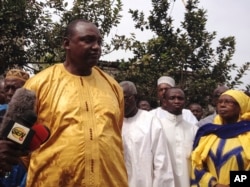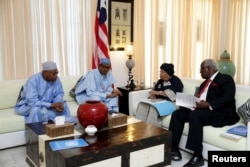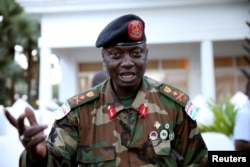The past week has seen Gambian President Yahya Jammeh's rhetoric grow increasingly defiant and hawkish as his government clamps down on dissent.
Jammeh has continued to dig in his heels with less than two weeks to go before the scheduled inauguration of President-elect Adama Barrow.
Jammeh has shut at least three private radio stations, and according to local new sites authorities have arrested people wearing t-shirts with the slogan “Gambia Has Decided,” a known statement of Barrow supporters.
The head of the electoral commission fled to neighboring Senegal after Jammeh said in his New Year’s address the elections chief had falsified results. Jammeh added that no one would cheat him. It was seen as a veiled threat.
The Senegal regional director of rights group Article 19, Fatou Jagne Senghor, says activists still hope for a peaceful transfer of power.
“You see it has been very clear that after the reversal of his decision, he targeted the electoral commission and after that he sealed their office, and all those days, this institution was not functioning. So you never know what the security apparatus is capable of doing in such a difficult situation,” she said.
The Jammeh government has been accused of numerous rights abuses during its 22 years in office, including arbitrary arrest, torture, and forced disappearances. The U.S. State Department Human Rights report said, “Officials routinely used various methods of intimidation to retain power.”
Jammeh initially accepted defeat in the December polls, but reversed course, calling for new elections. But the international community has recognized Barrow as the winner.
West African regional bloc ECOWAS put its standby force on alert, with Senegal at the lead. Jammeh hit back in his New Year’s speech saying an ECOWAS deployment would be “a declaration of war.”
But the regional approach appears to be negotiation and Senegalese President Macky Sall says military intervention should be a last resort.
The founder of the West African Citizen’s Think Tank, Gilles Yabi, says there may still be a path to a peaceful exit.
“I think it is true that Jammeh is a very special person and it is difficult to imagine traditional diplomatic pressures having some impact on Jammeh. But I think that when you think about pressures, it is not just about official threats or traditional diplomatic ways," he said. "I think it is also about changing the calculation of the people who are around Jammeh. The military leaders of the country, the objective of ECOWAS could be to make them change their minds by making it very clear that Jammeh will not stay in power.”
This week, Gambia’s army chief reaffirmed his support for Jammeh in a letter published in a pro-government newspaper.
International military historian at the University Félix Houphouët-Boigny in Abidjan, Arthur Banga, says the Gambian military would likely be no match for ECOWAS forces.
He said hopefully it will not come to that. He says it would look very bad for the ECOWAS region, and democracy in Africa in general, if Jammeh is still in power two or three weeks from now.















